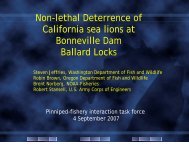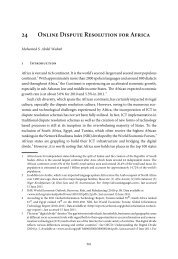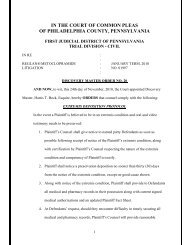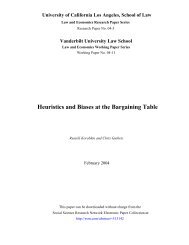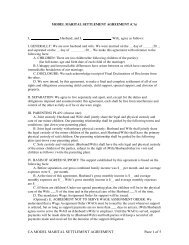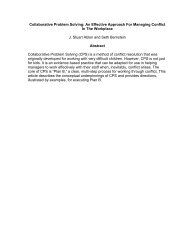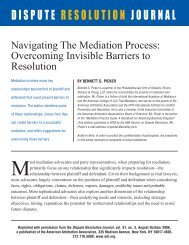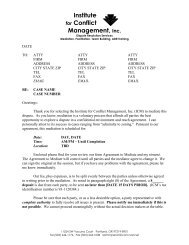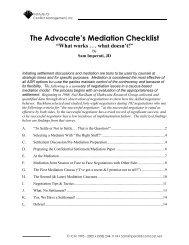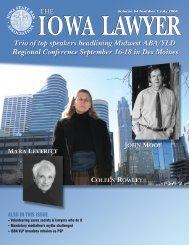Improving Clarity on Collaboration and Consensus ... - Mediate.com
Improving Clarity on Collaboration and Consensus ... - Mediate.com
Improving Clarity on Collaboration and Consensus ... - Mediate.com
Create successful ePaper yourself
Turn your PDF publications into a flip-book with our unique Google optimized e-Paper software.
<str<strong>on</strong>g>Improving</str<strong>on</strong>g> <str<strong>on</strong>g>Clarity</str<strong>on</strong>g> <strong>on</strong> Collaborati<strong>on</strong> <strong>and</strong> C<strong>on</strong>sensus Building Processes: The Ad Hoc Working Group <strong>on</strong> the Future of<br />
Collaborati<strong>on</strong> <strong>and</strong> C<strong>on</strong>sensus <strong>on</strong> Public Issues<br />
In 2006, CBI’s founder, Larry Susskind, <strong>and</strong> CBI partner-c<strong>on</strong>sultant, Suzanne Orenstein, recognized the need for<br />
professi<strong>on</strong>als working to apply various methods of c<strong>on</strong>sensus <strong>and</strong> collaborati<strong>on</strong> <strong>on</strong> public issues to <strong>com</strong>e together to<br />
discuss <strong>com</strong>m<strong>on</strong>alities am<strong>on</strong>g their various approaches <strong>and</strong> future directi<strong>on</strong>s for collaborative approaches. Following a<br />
very successful Associati<strong>on</strong> for C<strong>on</strong>flict Resoluti<strong>on</strong> c<strong>on</strong>ference <strong>on</strong> deliberative democracy <strong>and</strong> its links to public policy<br />
c<strong>on</strong>sensus building, Susskind <strong>and</strong> Orenstein c<strong>on</strong>vened a group of leaders of organizati<strong>on</strong>s working to improve dialogue,<br />
deliberati<strong>on</strong>, collaborati<strong>on</strong>, <strong>and</strong> c<strong>on</strong>sensus building to explore <strong>com</strong>m<strong>on</strong> approaches <strong>and</strong> principles. The group met in<br />
pers<strong>on</strong> <strong>and</strong> by c<strong>on</strong>ference call several times over two years, <strong>and</strong> produced a c<strong>on</strong>sensus visi<strong>on</strong> for collaborati<strong>on</strong> <strong>and</strong><br />
agreement <strong>on</strong> principles <strong>and</strong> prerequisites for effective collaborative work.<br />
Visi<strong>on</strong>: The visi<strong>on</strong> of the Ad Hoc Working Group <strong>on</strong> the Future of Collaborati<strong>on</strong> <strong>and</strong> C<strong>on</strong>sensus is for inclusive, effective,<br />
<strong>and</strong> fair collaborati<strong>on</strong> to be<strong>com</strong>e a routine part of governance <strong>and</strong> civic life. Increasing the use of collaborative<br />
practices can help achieve a fairer <strong>and</strong> more inclusive society, which will strengthen democracy <strong>and</strong> result in better<br />
decisi<strong>on</strong>s being made <strong>and</strong> implemented.<br />
Working Group Members <strong>and</strong> Missi<strong>on</strong>: The Ad Hoc Working Group is a group of leaders of professi<strong>on</strong>al groups who<br />
represent diverse approaches to collaborati<strong>on</strong> in public policy debates, but share a distinctive professi<strong>on</strong>al missi<strong>on</strong>:<br />
helping people work together in the face of serious differences <strong>on</strong> issues of public importance. The Working Group has<br />
<strong>com</strong>e together to advance the underst<strong>and</strong>ing <strong>and</strong> use of collaborati<strong>on</strong> in the public sphere. The list of members is<br />
included below.<br />
Principles: Bringing people together for c<strong>on</strong>structive c<strong>on</strong>versati<strong>on</strong> about public issues is not new; indeed it is probably<br />
<strong>on</strong>e of the oldest of human activities. There is a wide range of existing tools <strong>and</strong> processes for collaborati<strong>on</strong> work in the<br />
public arena. The Working Group has identified several hallmarks of good collaborative process that reflect the noti<strong>on</strong><br />
that creating forums for genuine <strong>com</strong>municati<strong>on</strong>, study <strong>and</strong> collaborative work produces significant benefits.<br />
• Direct interacti<strong>on</strong> <strong>and</strong> <strong>com</strong>municati<strong>on</strong>. Opportunities for c<strong>on</strong>structive interacti<strong>on</strong> are at the core of<br />
collaborati<strong>on</strong> <strong>and</strong> dispute resoluti<strong>on</strong>. While <strong>com</strong>municati<strong>on</strong>s <strong>and</strong> internet technologies help reach large<br />
numbers of people, they are usually best used to augment face-to-face dialogue <strong>and</strong> problem solving.<br />
• Diversity of views. Inclusive approaches to participati<strong>on</strong> make sure all points of view am<strong>on</strong>g those affected<br />
are wel<strong>com</strong>e <strong>and</strong> encouraged. Extra effort is frequently needed to ensure that sufficiently diverse views are<br />
represented, giving every<strong>on</strong>e the c<strong>on</strong>fidence that the major perspectives will be thoroughly discussed.<br />
• “D<strong>on</strong>e with, not d<strong>on</strong>e to.” Collaborati<strong>on</strong> creates forums where parties can work together voluntarily <strong>and</strong><br />
have a voice in shaping the process itself. Suspici<strong>on</strong> <strong>and</strong> c<strong>on</strong>flict are reduced if the structure <strong>and</strong> goals are<br />
transparent <strong>and</strong> not open to manipulati<strong>on</strong> by <strong>on</strong>e interest.<br />
• Timely informati<strong>on</strong>. Timely informati<strong>on</strong> that is accessible, both in terms of availability <strong>and</strong> underst<strong>and</strong>ing,<br />
helps ensure that all parties are empowered to be full participants <strong>and</strong> that factual issues are resolved in<br />
ways that are expeditious <strong>and</strong> clear to all.<br />
• Mutually beneficial results. Participants in any effort ask the basic questi<strong>on</strong>: does this out<strong>com</strong>e help<br />
achieve my goals? Collaborative efforts c<strong>on</strong>sciously work to ensure that the results are beneficial for all.<br />
• Focus <strong>on</strong> results <strong>and</strong> acti<strong>on</strong>. A good collaborative process keeps participants focused <strong>on</strong> achieving<br />
sustainable results – whether that result is improved relati<strong>on</strong>ships or acti<strong>on</strong>s that resolve problems. <str<strong>on</strong>g>Clarity</str<strong>on</strong>g><br />
about the purpose of the effort is critical to matching the process to the desired results.
Approaches to Collaborati<strong>on</strong>: The Working Group recognized that the diversity <strong>and</strong> multiplicity of approaches <strong>and</strong><br />
practices for building c<strong>on</strong>sensus <strong>and</strong> collaborati<strong>on</strong> <strong>on</strong> public issues can be c<strong>on</strong>fusing to those who seek to sp<strong>on</strong>sor or<br />
structure collaborative efforts for specific situati<strong>on</strong>s. Working Group members developed an overview spectrum of the<br />
purposes, out<strong>com</strong>es <strong>and</strong> prerequisites for success for various approaches to collaborati<strong>on</strong>. The spectrum is being used<br />
in educati<strong>on</strong> <strong>and</strong> discussi<strong>on</strong> forums with the members of the Working Group organizati<strong>on</strong>s <strong>and</strong> professi<strong>on</strong>al groups <strong>and</strong><br />
appears below.<br />
Collaborati<strong>on</strong> <strong>on</strong> Public Issues in the Future: There is a growing recogniti<strong>on</strong> that the roles for dialogue <strong>and</strong><br />
collaborati<strong>on</strong> about public c<strong>on</strong>cerns are going to increase in <strong>com</strong>ing years. Politically involved acti<strong>on</strong> groups, for<br />
example AARP, are using dialogue to build public c<strong>on</strong>sensus <strong>on</strong> ec<strong>on</strong>omic <strong>and</strong> health policy in the US. Collaborative<br />
structures are being set up to focus the energy of corporati<strong>on</strong>s or NGOs <strong>on</strong> addressing climate change. Expertise in<br />
structuring collaborative forums <strong>and</strong> c<strong>on</strong>versati<strong>on</strong>s is needed, whether through the use of impartial collaborative<br />
specialists, or through the skills of those working in the collaborative forums to self guide the collaborati<strong>on</strong>.<br />
The variety of opportunities for collaborati<strong>on</strong> points to the need for increasing the knowledge, skills, <strong>and</strong> abilities for<br />
collaborati<strong>on</strong> am<strong>on</strong>g those seeking to make progress through collaborati<strong>on</strong> <strong>and</strong> dialogue <strong>on</strong> difficult public issues.
List of Members<br />
Peter Adler, Keyst<strong>on</strong>e Center<br />
Gail Bingham, RESOLVE<br />
Chris Carls<strong>on</strong>, Policy C<strong>on</strong>sensus Institute<br />
Susan Carpenter, Independent Facilitator<br />
Cindy Cook, Adamant Accord <strong>and</strong> Associati<strong>on</strong> for C<strong>on</strong>flict Resoluti<strong>on</strong><br />
Frank Dukes, Institute for Envir<strong>on</strong>mental Negotiati<strong>on</strong>, UVA<br />
D<strong>on</strong> Edwards, Justice & Sustainability Associates<br />
Michael Elliott, Envir<strong>on</strong>mental <strong>and</strong> Public Policy Secti<strong>on</strong>, Associati<strong>on</strong> for C<strong>on</strong>flict<br />
Resoluti<strong>on</strong><br />
Pat Field, C<strong>on</strong>sensus Building Institute<br />
Camer<strong>on</strong> Fraser, Internati<strong>on</strong>al Associati<strong>on</strong> of Facilitators<br />
John Godec, Internati<strong>on</strong>al Associati<strong>on</strong> for Public Participati<strong>on</strong> (IAP2)<br />
Phil Harter, American Bar Associati<strong>on</strong> Administrative Law Secti<strong>on</strong>, <strong>and</strong> Center for Dispute Resoluti<strong>on</strong>,<br />
University of<br />
Missouri Law School<br />
S<strong>and</strong>y Heierbacher, Nati<strong>on</strong>al Coaliti<strong>on</strong> for Dialogue <strong>and</strong> Deliberati<strong>on</strong><br />
Maggie Herzig, Public C<strong>on</strong>versati<strong>on</strong>s Project<br />
Matt Leighninger, Deliberative Democracy C<strong>on</strong>sortium<br />
Michael Lewis, JAMS<br />
Carolyn Lukensmeyer, America Speaks<br />
Raphael M<strong>on</strong>talvo, Florida CR C<strong>on</strong>sortium<br />
Lucy Moore, Independent Facilitator<br />
Suzanne Orenstein, Independent Facilitator, Co-Chair of Working Group<br />
Bill Potapchuk, Community Building Institute<br />
Susan Sherry, Center for Collaborative Policy, CA State University,<br />
Sacramento<br />
Larry Susskind, C<strong>on</strong>sensus Building Institute/Program <strong>on</strong> Negotiati<strong>on</strong> at Harvard Law<br />
School, MIT Dept. of Urban Studies <strong>and</strong> Planning, Co-Chair of Working Group<br />
Elissa T<strong>on</strong>kin, ADR Coordinator, U.S. EPA, New Engl<strong>and</strong>
SPECTRUM OF PROCESSES FOR COLLABORATION AND CONSENSUS-BUILDING IN PUBLIC DECISIONS 1<br />
EXPLORE/INFORM CONSULT ADVISE DECIDE IMPLEMENT<br />
Out<strong>com</strong>es 2<br />
Sample Processes<br />
• Improved underst<strong>and</strong>ing of<br />
issues, process, etc.<br />
• Lists of c<strong>on</strong>cerns<br />
• Informati<strong>on</strong> needs identified<br />
• Explore differing perspectives<br />
• Build relati<strong>on</strong>ships<br />
• Focus Groups<br />
• C<strong>on</strong>ferences<br />
• Open houses<br />
• Dialogues<br />
• Roundtable Discussi<strong>on</strong>s<br />
• Forums<br />
• Summits<br />
• Comments <strong>on</strong> draft<br />
policies<br />
• Suggesti<strong>on</strong>s for<br />
approaches<br />
• Priority<br />
c<strong>on</strong>cerns/issues<br />
• Discussi<strong>on</strong> of opti<strong>on</strong>s<br />
• Call for acti<strong>on</strong><br />
• Public meetings<br />
• Workshops<br />
• Charettes<br />
• Town Hall Meetings (w<br />
& w/o deliberative<br />
polls)<br />
• Community Visi<strong>on</strong>ing<br />
• Scoping meetings<br />
• Public Hearings<br />
• Dialogues<br />
• C<strong>on</strong>sensus or majority<br />
re<strong>com</strong>mendati<strong>on</strong>s, <strong>on</strong><br />
opti<strong>on</strong>s, proposals or<br />
acti<strong>on</strong>s, often directed to<br />
public entities<br />
• Advisory Committees<br />
• Task Forces<br />
• Citizen Advisory Boards<br />
• Work Groups<br />
• Policy Dialogues<br />
• Visi<strong>on</strong>ing Processes<br />
• C<strong>on</strong>sensus-based<br />
agreements am<strong>on</strong>g<br />
agencies <strong>and</strong> c<strong>on</strong>stituent<br />
groups <strong>on</strong> policies,<br />
lawsuits or rules<br />
• Regulatory Negotiati<strong>on</strong><br />
• Negotiated settlement of<br />
lawsuits, permits,<br />
cleanup plans, etc.<br />
• C<strong>on</strong>sensus meetings<br />
• <strong>Mediate</strong>d negotiati<strong>on</strong>s<br />
• Multi-party agreements<br />
to implement<br />
collaborative acti<strong>on</strong> <strong>and</strong><br />
strategic plans<br />
• Collaborative Planning<br />
processes<br />
• Partnerships for Acti<strong>on</strong><br />
• Strategic Planning<br />
Committees<br />
• Implementati<strong>on</strong><br />
Committees<br />
1 Developed by Suzanne Orenstein, Lucy Moore, <strong>and</strong> Susan Sherry, members of the Ad Hoc Working Group <strong>on</strong> the Future of Collaborati<strong>on</strong> <strong>and</strong> C<strong>on</strong>sensus <strong>on</strong> Public Issues, in c<strong>on</strong>siderati<strong>on</strong> of <strong>and</strong><br />
inspirati<strong>on</strong> from the spectra developed by Internati<strong>on</strong>al Associati<strong>on</strong> for Public Involvement (http://www.iap2.org/associati<strong>on</strong>s/4748/files/IAP2%20Spectrum_vertical.pdf) <strong>and</strong> the Nati<strong>on</strong>al Coaliti<strong>on</strong> for<br />
Dialogue <strong>and</strong> Deliberati<strong>on</strong> (http://www.thataway.org/exchange/files/docs/ddStreams1-08.pdf ).<br />
2 While all types of processes have intrinsic value <strong>on</strong> their own, out<strong>com</strong>es from the various types of processes <strong>on</strong> the left side of the spectrum tend to be incorporated into the out<strong>com</strong>es of the processes to<br />
the right. For example, informati<strong>on</strong> sharing <strong>and</strong> opti<strong>on</strong> identificati<strong>on</strong> usually occur as early stages in decisi<strong>on</strong>-focused processes.
Use When<br />
• Early in projects when issues<br />
are under development<br />
• When broad public educati<strong>on</strong><br />
<strong>and</strong> support are needed<br />
• When stakeholders see need<br />
to c<strong>on</strong>nect, but are wary<br />
• Want to test proposals<br />
<strong>and</strong> solicit public <strong>and</strong><br />
stakeholder ideas<br />
• Want to explore<br />
possibility of joint acti<strong>on</strong><br />
before <strong>com</strong>mitting to it<br />
• Want to develop<br />
agreement am<strong>on</strong>g<br />
various c<strong>on</strong>stituencies <strong>on</strong><br />
re<strong>com</strong>mendati<strong>on</strong>s, e.g. to<br />
public officials<br />
• Want certainty of<br />
implementati<strong>on</strong> for a<br />
specific public decisi<strong>on</strong><br />
• C<strong>on</strong>diti<strong>on</strong>s are there for<br />
successful negotiati<strong>on</strong><br />
• Want to develop<br />
meaningful <strong>on</strong>-going<br />
partnership to solve a<br />
problem of mutual<br />
c<strong>on</strong>cern<br />
• To implement joint<br />
strategic acti<strong>on</strong><br />
C<strong>on</strong>diti<strong>on</strong>s for<br />
Success<br />
• Participants will attend<br />
• There are questi<strong>on</strong>s<br />
or proposals for<br />
<strong>com</strong>ment<br />
• Affected groups <strong>and</strong>/or<br />
the public are willing to<br />
participate<br />
• Can represent broad<br />
spectrum of affected<br />
groups<br />
• Players agree to devote<br />
time<br />
• Can represent all<br />
affected interests <strong>and</strong><br />
potential “blockers”<br />
• All agree upfr<strong>on</strong>t to<br />
implement results,<br />
incl. “sp<strong>on</strong>sor”<br />
• Time, informati<strong>on</strong>,<br />
incentives <strong>and</strong><br />
resources are available<br />
for negotiati<strong>on</strong><br />
• Participants agree to<br />
support the goal for<br />
the effort<br />
• Participants agree to<br />
invest time <strong>and</strong><br />
resources<br />
• C<strong>on</strong>diti<strong>on</strong>s exist for<br />
successful negotiati<strong>on</strong>s



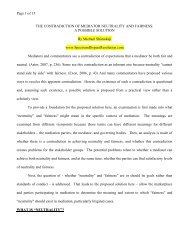
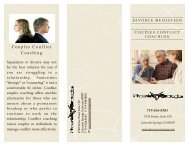
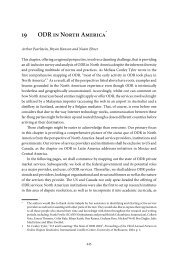
![Settlement Agreement Form [Agreement] - Mediate.com](https://img.yumpu.com/50682143/1/190x245/settlement-agreement-form-agreement-mediatecom.jpg?quality=85)
